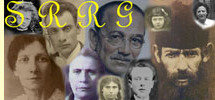



|
"Getting to know more about them" Chana /Anna Fleischman ??Reiter 1851-1939, born in Tarnopol, Lemberg, Austria (now Ternopil, Ukraine)
Of the four passengers journeying to America, I imagine the change was most devastating to Chana. Wife and mother, a professional woman, held in high esteem, educated and accomplished, Chana and her family enjoyed a position of respectability and good status in Mielnitza. Chana's income afforded the family economic and social security, and most importantly independence for her and Fischel. When Chana emigrated, she lost all of this. Chana was the daughter of Henie [unknown], c 1820-1901 and Ruvane Fleischman. She was born in the city of Tarnopol, Lemberg, Galicia, Austria. [see Chapter 4 on Towns, map, pictures]. Lena said Chana had two brothers who were astronomers. Unfortunately, I didn't ask their names nor anything more about them . I recall being awe-struck by what I was hearing and didn't want to stop my mother by interrupting what was to me an amazing story. Chana claimed to be related to the Fleischmann's of the Cincinnati Fleischmann yeast company. In the Fall of 1994, I traveled to Cincinnati to research archival sources, hoping to find the connection, if any. Charles Fleischmann , c1836-1892 (founder of Fleischmanns) and his many siblings were born in Pesth, Hungary. I suspect our maternal gg/father, Ruvane Fleischman, was born there too; Chana could read and write Hungarian. As of now, birth records from Hungary for the time frame of these individuals are not available. "Bobbie" [Ukrainian for Bubbe] as the family called Chana, was one of the most accomplished persons, certainly woman of her generation in our family. She could have rivaled a rabbi for her intelligence and education, and that she was a woman born in the mid-1800s makes her achievements all the more exceptional. Chana was orthodox, well versed in the Bible and Jewish customs. She gave birth to about 10 children [2 husbands], of which three survived: Julius, Hyman, and Lena. Chana's first husband had tuberculosis. He and their children died of the disease. Chana married again (possibly someone in the liquor business). She was married about one year and divorced--called a Get. It was very difficult to be given this, and that she was able to, says something. Perhaps it took money, position, and probably both.
Later she married my grandfather Fischel, about 11 years her senior. He brought two teen-age children to the marriage: Leibish/Louis (c 1865-1930) about age fourteen and his daughter, Bela Rivka/Rebecca (c1870-possibly 1940s). Fischel's first wife, also Chana Ruchel ? died in her 40s. They had several children who also died except for Leibish and Bela Rivka. The pictures of Fischel and Chana shown in this chapter were probably taken when they were married, c 1880. No longer working, Chana settled down to retirement and becoming a housewife--a new and unfamiliar position for her. When she worked, maids cared for Lena and the house. My mother always lamented that Chana was away. She (Lena) and I visited Blitzer cousins, Yetta and Jake, in New York when I was a teenager, (about 1947). They arranged for Lena to reunite with one of the young women who looked after her when she was growing up, Dvorah Schneider Flitter, (standing next to uncle Hyman in the cover picture of the tailor shop). They were thrilled to see one another. I wish I had been old and wise enough to appreciate the moment.
|
This page is hosted at no cost to the public by JewishGen, Inc., a non-profit corporation. If you feel there is a benefit to you in accessing this site, your JewishGen-erosity is appreciated.
© Copyright 2011 Suchostaw Region Research Group. All rights reserved.
Compiled by Susana Leistner Bloch and Edward Rosenbaum.
Back to SRRG Home Page | Jewish Gen Home Page | KehilaLinks Directory | Gesher Galicia | JewishGen Online Worldwide Burial Registry (JOWBR)
Last updated
02/27/2011 by ELR
Copyright © 2011 SRRG